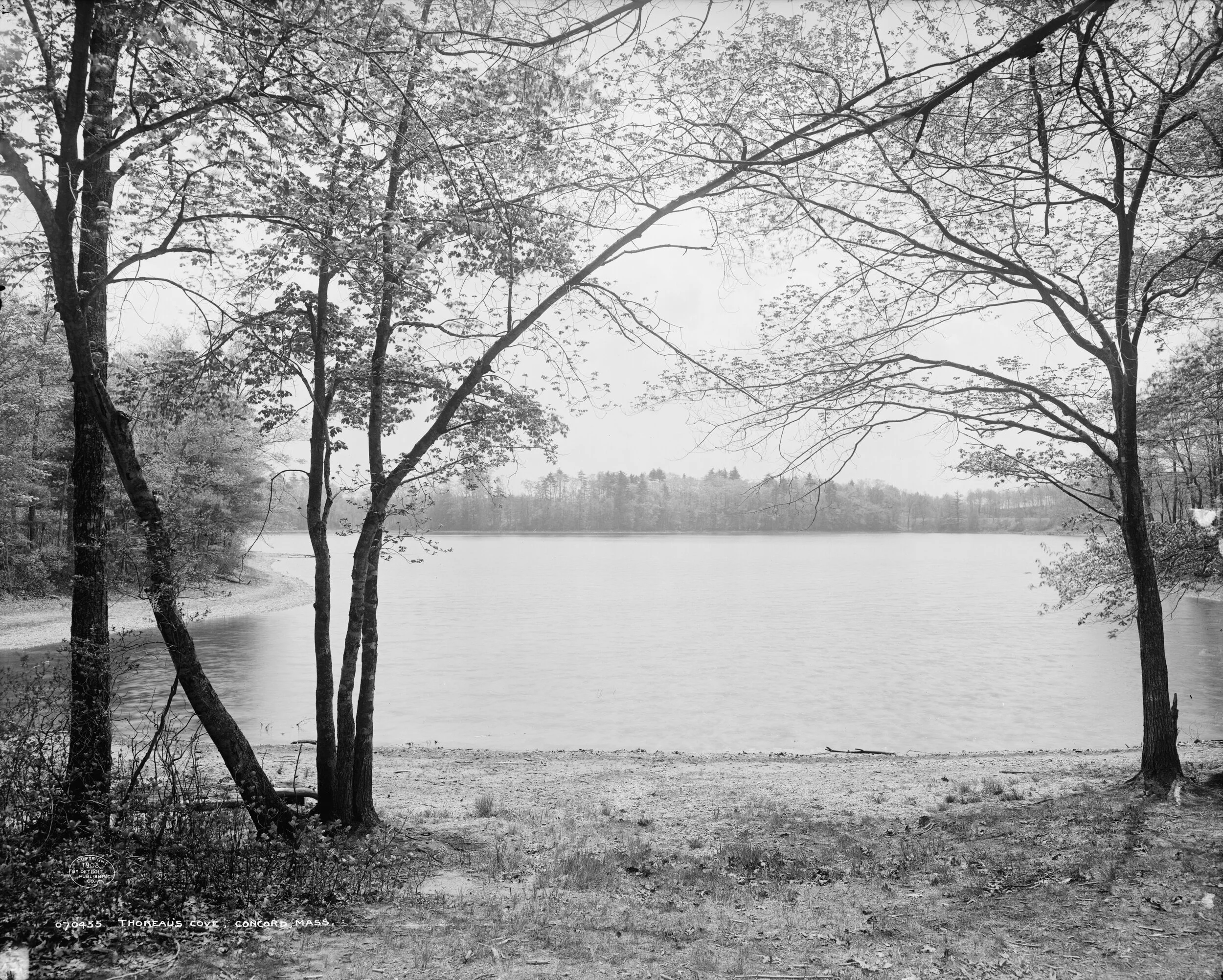Layoffs in the Time of Coronavirus — And Some Advice from Henry David Thoreau: "Simplify, Simplify."
Thoreau’s Cove, Walden Pond, 1908 Photograph by Detroit Publishing Company
The title of this post, “Layoffs in the Time of Coronavirus” is obviously a play on “Love in the Time of Cholera,” the title of the 1985 novel of that name by Gabriel García Márquez. Although I must admit that I’ve never read Love in the Time of Cholera, the title, to me at least, connotes hope and optimism in the face of hardship and adversity.
We are living in perilous times, both economically and from a public health standpoint. Thousands of people, both domestically and around the world, have died because of the effects of having contracted the COVID-19 coronavirus disease. Millions of people have been laid off from their jobs or furloughed, with no clear turning point for the resumption of normal business operations for companies that have been forced to downsize (or have downsized preemptively or reactively) because of the coronavirus pandemic. I myself recently found out that my full-time position as an instructional designer is being eliminated next week, so the coronavirus pandemic is hitting home for me personally and economically, if not (thankfully) regarding my health.
In times like these, I can’t help but think of Henry David Thoreau, the 19th-century American Transcendentalist philosopher and author, and his practical advice for living that he offers in his book Walden; or, Life in the Woods. Thoreau is the unequivocal expert not only in practical advice for living simply and minimalistically, but also in providing the philosophical and emotional framework for the necessary shift in life’s focus to accommodate such a lifestyle, whether by choice or by circumstance—such as the coronavirus pandemic.
I could delve into the minutiae of how exactly Thoreau was able to sustain himself, quite cheerily most of the time, for over two years living in a cabin he built with his own hands next to Walden Pond near Concord, Massachusetts. Naturally this included methods such as growing his own food (beans, for example) and fishing (of which Thoreau grew more and more distasteful over time, as he recounts in Walden). And it included focusing on enjoying the simple, transcendent pleasures of nature, of chance encounters and conversations with his neighbors, the sense of accomplishment in being truly self-sufficient, and prioritizing his own freedom of time instead of being caught up in the rat race of then-contemporary life with its hustle and bustle in “railroad fashion” as he describes American life in the 19th-century world encroaching on his oasis of independence that he had built for himself.
Instead of recounting the minutiae of Thoreau’s self-sufficiency, I believe much of what Thoreau has to say about self-sufficiency, hard economic times, true happiness, and true transcendence can be boiled down to a phrase that comes directly from Thoreau himself: “Simplify, simplify” (Thoreau, Walden, Where I Lived, and What I Lived For). This basic advice, to simplify, and then simplify some more, is important for many reasons. In hard times, naturally, it’s important to reduce unnecessary expenses, to make do with the old instead of giving in to the temptations of novelty, and to maintain a lifestyle of plainness and frugality instead of extravagance and excess.
Simplifying, is important for other reasons, however, in additional to purely economic reasons. Simplifying and slowing down allows the mind, the heart, and the soul to dwell more fully in the present, to find the simple pleasures and transcendent moments of day-to-day life that we tend to gloss over in busier or more affluent times. For Thoreau it may have been bathing in Walden Pond while musing about the glory dance of mosquitos buzzing about his cabin in the morning light. Or it was hearing the far-off locomotive whistle in the distance while hoeing his bean field. Or it was quiet conversation with his (sometimes-more, sometimes-less philosophical) neighbors who happened to stop by his cabin for a bite and a bit of conversation. Each of us, though, has his or her own ways of being fully present and immersed in one’s environment. For one person (like myself) it may be feeding the birds outside my window. For another (also like myself) it may be the quiet pleasure of reading or writing in solitude. For another it may be quiet moments with loved ones. For still another it might be a walk around the neighborhood or in the local park—the things that we tend to distract ourselves from when our modern careers and modern conveniences and modern cares.
Despite appearances, Thoreau doesn’t advocate escapism in his recommendation to simplify, and to simply some more. In calling for simplicity and frugality, Thoreau is reminding us how much of our uniquely human gifts and experiences don’t rely on excess or fortune. The pleasure of reading and learning, of communing with the minds of authors both contemporary and ancient, is available equally to the rich and poor alike. The pleasure of a walk in the woods, not merely of observing nature but being fully immersed in its grandeur, glory, and sublimity, is available to the prince and the pauper, to the Fortune 500 CEO and to the recently laid-off workers whose fates he or she controls with the stroke of a pen (or, more appropriately, a keystroke in these 21st-century times). The pleasures of reading and learning, of company and friendship, of nature and her majesty, of walking and talking, of experiments in living and self-sufficiency, are available equally to everyone who chooses to pursue them. But we must pursue them and purposefully seek them out, lest our time and energy, and ultimately our entire lives, be given away as slaves to the times in which we live—to the potentially endless quest for success, for notoriety, for wealth, or, for most of us, for mere economic survival in these perilous economic times filled with layoffs and furloughs en masse.
So, yes, simplify, and simplify some more, not merely out of necessity, however, but for its own sake, and to keep alive that inner spark of transcendence, of happiness, of peace of mind, and of the uniquely human experiences and joys that we tend to forget about in stabler economic times. Like the railroad of Thoreau’s day with its haunting whistle in the distance encroaching on the serenity of Thoreau’s beloved and wooded Concord landscape, the coronavirus pandemic should be a harbinger of the dangers to come if we don’t heed Thoreau’s advice to simplify—not just dangers to our lives, limbs, and prosperity, however, but dangers to our very souls and to our ability to remain human both in the face of adversity (coronavirus-related or otherwise) and in these 21st-century times, the pace of which is faster and busier than Thoreau himself could ever have imagined.
For Further Reading:
Walden; Or, Life in the Woods by Henry David Thoreau








